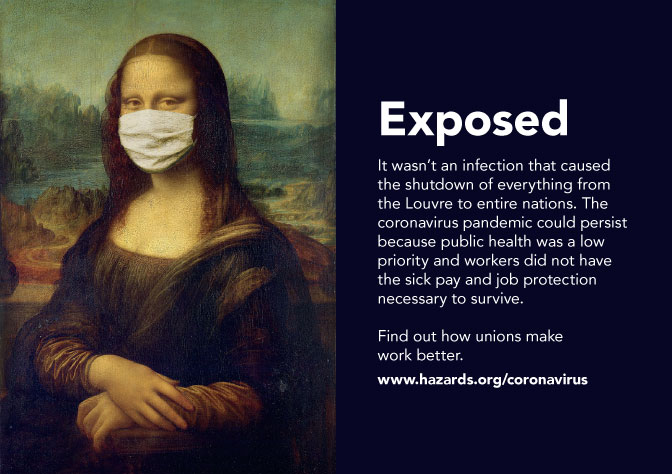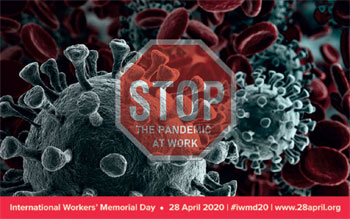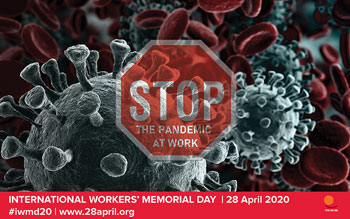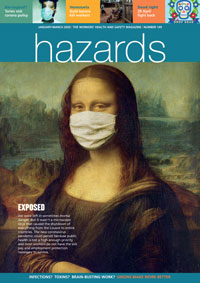

WILL HE GET IT? The prime minister Boris Johnson announced sombrely some of us are going to die as a result of the coronavirus, Covid-19. But unless he fixes permanently the country’s under-resourced health care system, its mean and patchy sick pay coverage and its disposable worker culture, the unfairness and the early deaths will continue. It is just the cause of death that will change.
After coronavirus, nothing will be the same again.
And that could be a good thing. Because the pandemic showed up how in a globalised economy routine workplace rights abuses come at a previously unimagined price.
Workers should be able to take sick leave when they are sick. But for most workers, that is rarely an option. We either fear falling foul of the slippery slope to job loss defined in sickness absence procedures or just have no right to sick pay at all.
So self-isolation in the cause of the public health could see you penniless and unable feed the kids. Like all public health emergencies, the worst off are hit hardest. Women and minorities are over-represented in the low-paid, high-risk and sometimes insecure caring jobs in the coronavirus frontline. Their emotional labour can come at a high personal cost.
Make it better
Promises to foot a part of the sick pay bill – for those in normal permanent employment and not among the lowest paid, at least – were quickly conceded by an underfire government. But this was never going to be enough.

TUC’s top 5 coronavirus campaign objectives
The TUC says the government must:
1 Ensure that business support measures are conditional on support for jobs. This can’t just be a bailout for boardrooms
2 fix the sick pay system to provide better sick pay for all
3 introduce targeted support for parents who need to take time out of work to care for kids
4 provide more help to families – and a stimulus to the economy
5 bring together a taskforce of unions and employers to help co-ordinate the national effort
The TUC – which has prepared coronavirus at work guidance for union reps – has maintained from the start of the crisis that the government should set up an emergency taskforce to deal with the coronavirus outbreak.
The union body’s protecting workers coronavirus campaign is calling on the UK government to follow other countries and introduce wage subsidies to protect working families and save jobs. A TUC report published on 18 March 2020 sets out proposals intended to build on chancellor Rishi Sunak’s 17 March plan to protect business and the economy.
TUC general secretary Frances O’Grady said: “The chancellor’s announcements so far will help protect businesses, but he must now urgently step up the protections that workers need too. Many other countries are using government wage subsidies to stop job losses and keep up economic activity. We need it too. And government support to businesses must be conditional on them producing a plan to protect jobs and wages.
The TUC report and related campaigns call for wage subsidies for short-time working, sick pay for all and parental leave support. It also says the government should provide further economic stimulus and must help people meet their rent, mortgage and debt payments, as well as giving people on benefits or pensions a significant bump in income.
The government announced on 20 March 2020 it would pay 80 per cent of the wages of employees unable to work due to the coronavirus pandemic. But the measures announced by chancellor Rishi Sunak do no cover those losing income because they are on reduced hours.
On 26 March 2020, the chancellor caved into demands from the TUC and a succession of unions representing gig workers, musicians, actors, journalists and others in insecure employment and announced of a new income support scheme for self-employed workers.
TUC general secretary Frances O’Grady commented: “This is a welcome step forward for self-employed and freelance workers across the economy, from construction to the creative industries. It’s vital that support reaches workers as soon as possible. Many are already dealing with severe hardship. Unions look forward to being consulted on how this scheme is rolled out.”
Recession depression
Ministers need to pull together the national taskforce involving employers, unions and government agencies, the TUC says, to make sure the coronavirus crisis doesn’t mutate into a recession and mass unemployment.
It is a real fear. An 18 March 2020 initial assessment from the International Labour Organisation (ILO) estimated about 25 million jobs could be lost globally as a result of the pandemic. The ILO, part of the United Nations (UN), called for “urgent, large-scale and coordinated measures across three pillars: protecting workers in the workplace, stimulating the economy and employment, and supporting jobs and income."
One lesson from earlier dodged bullets – the SARS and MERS outbreaks, also caused by coronaviruses but which through good fortune largely bypassed the UK – was that workers are in the frontline when it comes to exposure to infectious diseases. It is the same with this novel coronavirus.

Global reaction The International Trade Union Confederation (ITUC) has called for urgent action to address the coronavirus pandemic. It says governments must respond through an “economic stimulus to save jobs and lives – money must reach people.” The global union body is demanding paid sick leave for all workers and income support and employment protection. ITUC adds that occupational health and safety must be recognised as a fundamental right at work. “The prevention of more deaths requires workers’ rights to negotiate hygienic workplaces and work practices through their unions,” it says.
More information: www.ituc-csi.org/covid-19-responses
A January 2020 editorial in the journal Occupational Medicine noted that a wide-range of workers had ‘probable occupationally-acquired’ coronavirus, with 17 of the first 25 locally transmitted cases in Singapore (68 per cent) “probably related to occupational exposure. They included staff in the tourism, retail and hospitality industry, transport and security workers, and construction workers.”
In Italy, a 13 March 2020 update from the government’s coronavirus taskforce noted healthcare workers made up 8.4 per cent of the country’s cases, at that time affecting 1,423 out of a population total of 16,295 cases. Italy’s work-related figure is all the more shocking given nearly 40 per cent of all cases were in those aged over 70. Later estimates from Italian unions put the work-related proportion of cases higher still, at 12 per cent.
Chronic condition

ESSENTIAL ACTION Unions representing staff at the Health and Safety Executive (HSE) have called on their management to directly intervene with the government on behalf of the public and their members. more
In Britain, the government is attempting to apply a temporary fix to a chronic problem. But you can’t recreate a public health system on the hoof and just for the duration of the current crisis, any more than you can retool a tractor plant overnight to make hospital ventilators.
Nor can you argue one single infectious disease should be an exception where you concede the need for fairness in the sick pay and employment rights system.
Coronavirus has highlighted a potentially terminal malaise in the system. Fixing the country’s under-resourced health care system, its mean and patchy sick pay coverage and the rife and growing disposable worker culture is the only healthy prescription for the future.
Resources
Coronavirus/ COVID-19 Guidance to Unions, TUC, March 2020.
NHS coronavirus webpages and guidance for clinicians. NHS Staff Council statement on Covid-19.
David Koh. Editorial: Occupational risks for COVID-19, Occupational Medicine, volume 70, number 1, pages 3-5, January 2020. Published online 28 February 2020.
Protecting workers’ jobs and livelihoods: The economic response to coronavirus, TUC report, 18 March 2020.
COVID-19 and world of work: Impacts and responses, International Labour Organisation (ILO) Note, 18 March 2020.
International Trade Union Confederation (ITUC) Covid-19 resource page.
Public Service International (PSI) Safe Workers Save Lives campaign, part of PSI’s Public Health, Once and for All campaign.
Health and Safety Executive (HSE) coronavirus webpages and infection risks at work webpages.
COVID-19: Guidance for infection prevention and control in healthcare settings, Public Health England, 2020.
NHS coronavirus webpages and guidance for clinicians. NHS Staff Council statement on Covid-19.
Thompsons Solicitors briefing on coronavirus and the UK law at work.
Health and Safety Executive (HSE) coronavirus webpages and infection risks at work webpages.
Workers worldwide need coronavirus protection

Global union confederation ITUC is calling for urgent measures to ensure workers who show possible coronavirus symptoms have access to free health care and can take sick leave without fear of losing their jobs or their incomes.
With the World Health Organisation (WHO) warning in early March of a “very high risk of global spread and impact” of the disease, the union body says workplaces are ‘frontlines’ in combatting the infection’s proliferation.
“The WHO is warning of very high risk of global spread and impact of the virus, and workplaces are at the centre of containment and mitigation efforts. Many millions of people around the world have no right to take sick leave or face financial ruin if they have to go into isolation. That exposes them, their colleagues and the public to the risk of serious disease and can only accelerate its spread,” said ITUC general secretary Sharan Burrow.
“Along with all the other urgent measures required, governments need to ensure that employers provide time off without penalty for people who have symptoms, and to fill the gaps in social protection that make it difficult for people to stop work when they are sick. Never has the need for paid sick leave been more evident.”
ITUC said that while the infection risk is highest for health workers, especially where protective equipment and facilities are lacking or sub-standard, other sectors – in particular where large numbers of people gather or are in transit – can also be major vectors for transmission.
Global union UNI also warned that “workers are in the frontlines of the fight” against the virus. “The tragic, disruptive consequences of this outbreak are growing daily, but in country after country, unions are stepping up to protect the safety of not only their members but of their communities. They are holding employers accountable to do their part to prevent the spread of this virus,” said Christy Hoffman, UNI general secretary. “This means adequate protective equipment and proper training as well as ensuring that sick workers can recover physically while not suffering financially.”
She added: “As during many other crises, our affiliates are showing the world that unions are here to promote the general welfare, remove fears, dispel myths and achieve immediate action to protect our communities.”
Government cuts created virus ‘hygiene nightmare’
Government cuts have heightened public hygiene problems with the closure of more than a fifth of public toilets in Britain during the past decade, according to figures collated by the union UNISON. People across the country are being urged to wash their hands frequently and thoroughly in a government information campaign aimed at containing the spread of Covid-19, or coronavirus.
But freedom of information (FoI) figures gathered by UNISON show there has been a 22 per cent drop in the number of public toilets maintained by councils since 2010, with the closure of 979. Almost 400 councils across England, Scotland and Wales were contacted, with data supplied by 87 per cent.
UNISON head of local government Jon Richards said: “Ministers can’t wash their hands of responsibility for the hygiene problems that could now haunt the country.” He added: “The savage cuts forced on councils have also created wider problems. Reduced resources will have left many woefully unprepared to tackle a public health problem that’s worsening by the day.”
GMB wins full pay for self-isolated health staff
The union GMB scored an early win for thousands of workers after private outsourcing company ISS promised full pay for all its health worker employees if they are forced to self-isolate due to coronavirus. The union said it has pressured NHS outsourcing companies – and the government – to ensure all workers are given full pay from day one if forced to self-isolate.
GMB said the government “already has the powers to solve this public health crisis and could introduce a statutory right to normal pay during any period of self-isolation recommended by PHE, by amending rights which already exist under the Employment Rights Act 1996.”
Lola McEvoy, GMB organiser, said: “Full pay from day one for NHS contract workers is an urgent priority for public safety given the escalating coronavirus crisis.” GMB national officer Rachel Harrison added: “Following intense pressure from GMB, ISS has done the right thing. Now all NHS employers – and employers across all sectors in the UK – must follow suit and do their bit to stem the tide of coronavirus.”
Medirest, Sodexo, Interserve and Mitie have also now agreed to pay protection for their staff working in the health service.
Will the watchdog bark?
Unions representing staff at the Health and Safety Executive (HSE) have called on their management to directly intervene with the government on behalf of the public and their members.
Prospect, the FDA and PCS have written a joint letter to the chair and the chief Executive of the HSE, Martin Temple and Sarah Albon, asking them to fulfil their duty as the independent regulator in charge of enforcing health and safety at work.
The 25 March 2020 letter from HSE unions says that despite guidance from the government that only essential workers should be going to work, some employers are stretching the interpretation of this to keep as many people as they can working. This is putting workers in danger, potentially putting HSE inspectors at risk if they have to visit a workplace, and increasing the likelihood of insurmountable pressures on the NHS, they add.
The letter asks that: “You as chair and chief executive respectively to press Her Majesty’s Government to order the suspension of all non-essential work where guarantees cannot be given that risks to workers and to your own employees who may be called to an incident are not being managed in accordance with the law.”
The letter was written after members of the three unions raised concerns about practices in a variety of industries including construction, energy, retail and others.
Garry Graham, Prospect deputy general secretary said: “The government has been consistently behind the curve on its response to the epidemic in its advice to workers and employers. We are now in lockdown but we still see the situation where morning Tubes are rammed with people, many of whom are in no way essential workers.
“The HSE has a regulatory duty to protect health and safety at work. They need to intervene on workers’ behalf and make sure the government is crystal clear on who should be going out to work, and who should not. If you leave things open to interpretation, some employers will inevitably take advantage and put workers at risk.”
Exposed
It wasn’t a microscopic virus that caused the shutdown of entire countries. Hazards editor Rory O’Neill notes the new coronavirus pandemic could persist because public health is not a high enough priority and most workers do not have the sick pay and employment protection necessary to survive.
| Contents | |
| • | Introduction |
| • | Make it better |
| • | Recession depression |
| • | Chronic condition |
| • | Resources |
| Other stories | |
| • | Workers worldwide need coronavirus protection |
| • | Government cuts created virus ‘hygiene nightmare’ |
| • | GMB wins full pay for self-isolated health staff |
| Will the watchdog bark? | |
| Hazards webpages | |
| • | Hazards news |
| • | Infections |
| • | Work and health |
 See Hazards's dedicated Coronavirus resource pages
See Hazards's dedicated Coronavirus resource pages

